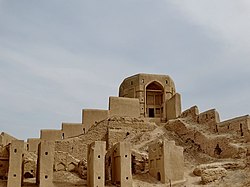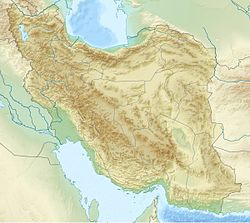Zabol (Persian: ⓘ, also transliterated as Zâbol or Zābul)[3] is a city in the Central District of Zabol County, Sistan and Baluchestan province, Iran, serving as capital of both the county and the district.[4] Zabol is near the border with Afghanistan. Referred to as Sistan until the late 1920s, the city was renamed Zabol by Reza Shah Pahlavi.[5]
Zabol
Persian: زابل Zābul | |
|---|---|
City | |
 | |
| Coordinates: 31°02′02″N 61°29′16″E / 31.03389°N 61.48778°E[1] | |
| Country | Iran |
| Province | Sistan and Baluchestan |
| County | Zabol |
| District | Central |
| Population (2016)[2] | |
| • Urban | 134,950 |
| Time zone | UTC+3:30 (IRST) |
At the 2006 census, its population was 130,642 in 27,867 households.[6] The following census in 2011 counted 137,722 people in 33,957 households.[7] The latest census in 2016 showed a population of 134,950 people in 35,401 households.[2]
Zabol is located near Lake Hamun and the region is irrigated by the Helmand River. Lake Hamun is a seasonal lake that is often dry. The people of Zabol are Sistani who speak a variant of the Persian language and known as Sistani or Seistani which is very similar to Dari, also known as Afghan Persian.
The city is home to Zabol University, the largest university in the city, as well as the Zabol Medical Science University and the Sistan Museum of Anthropology. Zabol has a regional airport.
Zabol is connected by road to Milak and Zaranj (across the border in Afghanistan). The Delaram-Zaranj Highway provides road connectivity to the rest of Afghanistan. Zabol thus provides Afghanistan access to the Arabian Sea and Persian Gulf via the Port of Chabahar.
Geography edit
Zabol is located near Lake Hamun and the region is irrigated by the Helmand River.
Zabol is connected by road to Milak and Zaranj (across the border in Afghanistan). The Delaram-Zaranj Highway provides road connectivity to the rest of Afghanistan. Zabol thus provides Afghanistan access to the Arabian Sea and Persian Gulf via the Port of Chabahar.
Air pollution edit
The Zabol area is well known for its "120-day wind" (bād-e sad-o-bist-roz), a highly persistent dust storm in the summer which blows from north to south. The disappearance in the 2000s of the nearby Hamoun wetlands has exacerbated the dusty conditions in Zabol,[8] leading the World Health Organization to name Zabol the most polluted city in the world in 2016.[9] A 2017 study in the journal Preventive Medicine suggested that the harm from 30 minutes of cycling outdoors in Zabol's polluted air would outweigh the benefits of the exercise.[10]
Climate edit
Zabol has a hot desert climate (Köppen climate classification BWh).
| Climate data for Zabol (normals 1991-2020, extremes 1962–2020) | |||||||||||||
|---|---|---|---|---|---|---|---|---|---|---|---|---|---|
| Month | Jan | Feb | Mar | Apr | May | Jun | Jul | Aug | Sep | Oct | Nov | Dec | Year |
| Record high °C (°F) | 29.0 (84.2) |
32.8 (91.0) |
42.3 (108.1) |
43.0 (109.4) |
48.0 (118.4) |
50.8 (123.4) |
49.8 (121.6) |
51.0 (123.8) |
46.8 (116.2) |
42.6 (108.7) |
36.0 (96.8) |
29.0 (84.2) |
51.0 (123.8) |
| Mean daily maximum °C (°F) | 15.9 (60.6) |
19.4 (66.9) |
25.4 (77.7) |
32.3 (90.1) |
37.5 (99.5) |
41.3 (106.3) |
42.5 (108.5) |
40.8 (105.4) |
36.9 (98.4) |
31.0 (87.8) |
23.4 (74.1) |
17.6 (63.7) |
30.3 (86.6) |
| Daily mean °C (°F) | 8.5 (47.3) |
11.6 (52.9) |
17.3 (63.1) |
23.9 (75.0) |
29.5 (85.1) |
33.6 (92.5) |
35.3 (95.5) |
33.6 (92.5) |
28.9 (84.0) |
22.3 (72.1) |
15.0 (59.0) |
9.7 (49.5) |
22.4 (72.4) |
| Mean daily minimum °C (°F) | 2.1 (35.8) |
4.8 (40.6) |
9.9 (49.8) |
16.1 (61.0) |
21.7 (71.1) |
26.2 (79.2) |
28.7 (83.7) |
27.2 (81.0) |
21.7 (71.1) |
14.7 (58.5) |
7.9 (46.2) |
3.0 (37.4) |
15.3 (59.6) |
| Record low °C (°F) | −12.0 (10.4) |
−9.0 (15.8) |
−2.2 (28.0) |
3.0 (37.4) |
7.2 (45.0) |
14.0 (57.2) |
19.0 (66.2) |
12.0 (53.6) |
6.0 (42.8) |
0.0 (32.0) |
−4.0 (24.8) |
−10.0 (14.0) |
−12.0 (10.4) |
| Average precipitation mm (inches) | 12.5 (0.49) |
9.9 (0.39) |
14.8 (0.58) |
4.6 (0.18) |
1.2 (0.05) |
0.1 (0.00) |
0.0 (0.0) |
0.0 (0.0) |
0.0 (0.0) |
0.3 (0.01) |
2.2 (0.09) |
5.7 (0.22) |
51.3 (2.01) |
| Average snowfall cm (inches) | 0.4 (0.2) |
0.1 (0.0) |
0.0 (0.0) |
0.0 (0.0) |
0.0 (0.0) |
0.0 (0.0) |
0.0 (0.0) |
0.0 (0.0) |
0.0 (0.0) |
0.0 (0.0) |
0.0 (0.0) |
0.0 (0.0) |
0.5 (0.2) |
| Average precipitation days (≥ 1.0 mm) | 2.2 | 2.0 | 2.8 | 1.1 | 0.4 | 0.0 | 0.0 | 0.0 | 0.0 | 0.1 | 0.8 | 1.1 | 10.5 |
| Average snowy days | 0.2 | 0 | 0 | 0 | 0 | 0 | 0 | 0 | 0 | 0 | 0 | 0 | 0.2 |
| Average relative humidity (%) | 50 | 45 | 42 | 35 | 27 | 22 | 19 | 19 | 20 | 27 | 39 | 47 | 33 |
| Average dew point °C (°F) | −1.5 (29.3) |
−0.2 (31.6) |
3.4 (38.1) |
6.9 (44.4) |
7.7 (45.9) |
8.3 (46.9) |
8.4 (47.1) |
6.3 (43.3) |
2.9 (37.2) |
1.9 (35.4) |
0.6 (33.1) |
−1.5 (29.3) |
3.6 (38.5) |
| Mean monthly sunshine hours | 211 | 209 | 232 | 265 | 314 | 327 | 334 | 326 | 303 | 291 | 240 | 218 | 3,270 |
| Mean daily daylight hours | 10.4 | 11.1 | 12 | 12.9 | 13.7 | 14.1 | 13.9 | 13.2 | 12.3 | 11.4 | 10.6 | 10.2 | 12.1 |
| Average ultraviolet index | 4 | 5 | 6 | 7 | 9 | 9 | 9 | 8 | 7 | 6 | 5 | 3 | 7 |
| Source 1: NOAA NCEI[11] (snowfall and snow/sleet days for 1981-2010)[12] | |||||||||||||
| Source 2: Iran Meteorological Organization (records)[13] Weather Atlas (UV index and daylight hours)[14] | |||||||||||||
Colleges and universities edit
- Zabol University
- Zabol University of Medical Sciences
- Islamic Azad university, Zabol Branch
- Payame-noor university of Zabol
Media related to Zabol at Wikimedia Commons
References edit
- ^ OpenStreetMap contributors (21 April 2023). "City, Zabol County" (Map). OpenStreetMap. Retrieved 21 April 2023.
- ^ a b "Census of the Islamic Republic of Iran, 1395 (2016)". AMAR (in Persian). The Statistical Center of Iran. p. 11. Archived from the original (Excel) on 23 December 2021. Retrieved 19 December 2022.
- ^ Zabol can be found at GEOnet Names Server, at this link, by opening the Advanced Search box, entering "-3781433" in the "Unique Feature Id" form, and clicking on "Search Database".
- ^ Habibi, Hassan (21 June 1369). "Approval of the organization and chain of citizenship of the elements and units of the national divisions of Sistan and Baluchestan province, centered in the city of Zahedan". Research Center of the System of Laws of the Islamic Council of the Farabi Library of Mobile Users (in Persian). Ministry of Interior, Defense Political Commission of the Government Board. Archived from the original on 24 July 2013. Retrieved 29 December 2023.
- ^ Skrine, Clarmont (1962). World War In Iran. Constable & Company. p. 68.
- ^ "Census of the Islamic Republic of Iran, 1385 (2006)". AMAR (in Persian). The Statistical Center of Iran. p. 11. Archived from the original (Excel) on 20 September 2011. Retrieved 25 September 2022.
- ^ "Census of the Islamic Republic of Iran, 1390 (2011)". Syracuse University (in Persian). The Statistical Center of Iran. p. 11. Archived from the original (Excel) on 25 November 2022. Retrieved 19 December 2022.
- ^ Vidal, John; Kamali, Saeed (12 May 2016). "Which are the world's two most polluted cities – and why?". The Guardian. London. Retrieved 14 February 2017.
- ^ Miles, Tom (12 May 2016). "Iranian, Indian cities ranked worst for air pollution". Reuters. Retrieved 14 February 2017.
- ^ Van Mead, Nick (13 February 2017). "Tipping point: revealing the cities where exercise does more harm than good". The Guardian. Retrieved 14 February 2017.
- ^ "World Meteorological Organization Climate Normals for 1991-2020: Zabol-40829" (CSV). ncei.noaa.gov (Excel). National Oceanic and Atmosoheric Administration. Retrieved 28 April 2024.
{{cite web}}: CS1 maint: postscript (link) - ^ "World Meteorological Organization Climate Normals for 1981-2010: Zabol-40829" (XLS). ncei.noaa.gov (Excel). National Oceanic and Atmosoheric Administration. p. 21. Retrieved 28 April 2024.
{{cite web}}: CS1 maint: postscript (link) - ^
- "Highest record temperature in Zabol by Month 1962–2010". Iran Meteorological Organization. Retrieved 8 April 2015.
- "Lowest record temperature in Zabol by Month 1962–2010". Iran Meteorological Organization. Retrieved 8 April 2015.
- ^ "Monthly weather forecast and climate in Zabol, Iran". Weather Atlas. Retrieved 11 January 2022.

